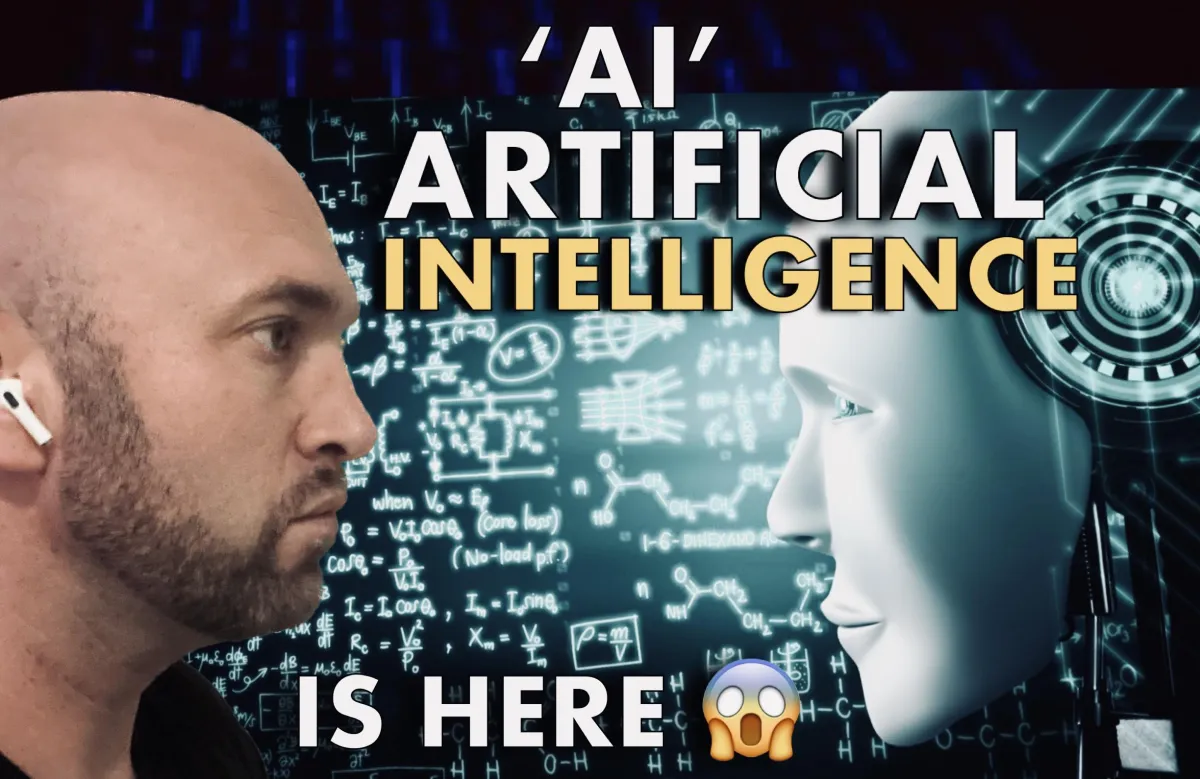Investor Syndicate Blogs
Download The Deal Flipping Playbook

Unleashing the Potential: ChatGPT is Transforming Human Interaction
“The future of 'AI' is Here!! .” - Ben Lovro
Introduction:
ChatGPT is a language model developed by OpenAI that is based on the GPT architecture, which is a neural network that is trained to generate natural language text. The "chat" part of the name comes from the fact that it was specifically trained to generate text that simulates human conversation, making it well-suited for tasks such as answering questions, generating responses in a conversation, or generating descriptive text about a given topic.
"ChatGPT will change the future by allowing businesses and individuals to communicate, process information and make decisions in a more natural and efficient way, by providing human-like understanding and conversation, it will be possible to automate tasks and extract insights, improving customer experience and enabling new possibilities for interaction and collaboration!" 👊
What is Chat GPT?
ChatGPT is a type of language model developed by OpenAI. It is based on the GPT (Generative Pre-training Transformer) architecture, which is a type of neural network that is trained to generate natural language text. The "chat" part of the name comes from the fact that it was specifically trained to generate text that simulates human conversation, making it well-suited for tasks such as answering questions, generating responses in a conversation, or generating descriptive text about a given topic.
When given a piece of text, such as a question or a prompt, ChatGPT generates a response by predicting the next word in the text, one word at a time. As it generates each word, it also updates its internal state, which encodes information about the context of the text. This allows it to generate responses that are coherent and contextually appropriate.
The model was trained on a large dataset of conversational text, such as conversation from internet forums, customer service chats and other conversational data, allowing it to learn the patterns of human language and become capable to generate natural language text similar to human generated one.
In summary ChatGPT is a language model that generates human-like text, which makes it good for language-related tasks, such as answering questions, chatbot, and language translation, specially those that have a conversational nature.
8 Reasons Why Chat GPT Will Change The Way That Humans Interact
One way in which AI and ChatGPT will change the way humans interact is through the development of more advanced chatbots and virtual assistants. Chatbots powered by ChatGPT and other language models will be able to understand and respond to a wider range of human inputs, allowing them to handle more complex tasks and provide more accurate and helpful responses. This will lead to the automation of many customer service and support tasks, which will save businesses time and money while also improving the customer experience.
Another important change that AI and ChatGPT will bring is the ability to understand human emotions and sentiment. As the language models continue to improve in their ability to process and understand human text, they will be able to determine how a person is feeling based on their words, allowing them to provide more personalized and empathetic responses. Businesses will be able to use this technology to improve customer satisfaction and loyalty by providing more tailored and compassionate interactions.
Another big change that AI and ChatGPT will bring is the ability to communicate with non-human entities such as machines or devices. As ChatGPT and other AI models improve, the ability to translate human instructions to machines, and viceversa will make possible for humans to interact with machines or devices in a more natural way. This will have a significant impact on many industries such as Manufacturing, IoT, and smart homes, where devices will be able to understand and respond to human instructions.
ChatGPT will also lead to the development of more sophisticated language generation tools that can be used to create written content, such as articles, emails, and social media posts. This technology will make it possible for businesses to produce high-quality written content more quickly and at a lower cost, making it more accessible to small and medium-sized businesses, which would not have otherwise been able to afford human writers.
In addition, the advancements in language models like ChatGPT, will enable to improve the way that businesses process and analyze large amount of unstructured data such as customer feedback, social media posts, and more. For example, businesses will be able to extract insights from customer feedback, discover patterns and trends, and make better decisions. This will enable businesses to develop more effective products, services and also improve their overall performance.
Another way in which AI and ChatGPT will change the way businesses operate is by increasing the efficiency of business processes. ChatGPT can be trained to automate repetitive tasks, such as data entry, scheduling, and other tasks that do not require human intelligence. This will free up human employees to focus on more creative and strategic work, while also reducing errors and improving the overall speed of operations.
Another area where AI and ChatGPT will have an impact is in the field of language translation. As ChatGPT and other language models continue to improve in their ability to understand and generate different languages, they will make it easier for businesses to communicate with customers, partners, and suppliers around the world. This will be especially important for global businesses that operate in multiple countries, as it will allow them to more effectively communicate with customers and partners in different languages.
Lastly, AI and ChatGPT will also change the way that humans interact with the digital world. As more advanced chatbots and virtual assistants become available, they will make it possible for people to interact with digital devices, applications, and services in a more natural and conversational way. This will make it easier for people to access information, complete tasks, and make purchases, which will lead to a more seamless and efficient digital experience for users.
The Future of Business is Here: Meet Your 'AI' Assistant
As businesses look for ways to stay competitive in today's fast-paced digital world, many are turning to the latest advancements in artificial intelligence (AI) and natural language processing (NLP) to gain a competitive edge. One technology that is poised to have a major impact on the way businesses operate is ChatGPT.
ChatGPT is a language model developed by OpenAI that is based on the GPT architecture, which is a neural network that is trained to generate natural language text. The "chat" part of the name comes from the fact that it was specifically trained to generate text that simulates human conversation, making it well-suited for tasks such as answering questions, generating responses in a conversation, or generating descriptive text about a given topic.
One of the biggest benefits of ChatGPT for businesses is the ability to automate customer service and support tasks. Chatbots powered by ChatGPT will be able to understand and respond to a wider range of human inputs, allowing them to handle more complex tasks and provide more accurate and helpful responses. This will save businesses time and money, while also improving the customer experience.
Another important change that ChatGPT will bring is the ability to understand human emotions and sentiment. As the language model continues to improve in its ability to process and understand human text, it will be able to determine how a person is feeling based on their words, allowing it to provide more personalized and empathetic responses. Businesses will be able to use this technology to improve customer satisfaction and loyalty by providing more tailored and compassionate interactions.
ChatGPT will also lead to the development of more sophisticated language generation tools that can be used to create written content, such as articles, emails, and social media posts. This technology will make it possible for businesses to produce high-quality written content more quickly and at a lower cost, making it more accessible to small and medium-sized businesses that would not have otherwise been able to afford human writers.
In addition, advancements in language models like ChatGPT will enable businesses to process and analyze large amounts of unstructured data such as customer feedback, social media posts, and more. This will enable businesses to extract insights, discover patterns and trends, and make better decisions. This will enable businesses to develop more effective products, services, and improve their overall performance.
Another way in which ChatGPT will change the way businesses operate is by increasing the efficiency of business processes. ChatGPT can be trained to automate repetitive tasks, such as data entry, scheduling, and other tasks that do not require human intelligence. This will free up human employees to focus on more creative and strategic work, while also reducing errors and improving the overall speed of operations.
Another area where ChatGPT will have an impact is in the field of language translation. As ChatGPT and other language models continue to improve in their ability to understand and generate different languages, they will make it easier for businesses to communicate with customers, partners, and suppliers around the world. This will be especially important for global businesses that operate in multiple countries, as it will allow them to more effectively communicate with customers and partners in different languages.
Lastly, ChatGPT will also change the way that humans interact with the digital world. As more advanced chatbots and virtual assistants become available, they will make it possible for people to interact with digital devices, applications, and services in a more natural and conversational way. This will make it easier for people to access information, complete tasks, and make purchases, leading to a more seamless and efficient digital experience for users.
In conclusion, ChatGPT is a game-changer for businesses looking to stay competitive
Get Ready For The New Frontier: It's Already Here!
ChatGPT and Artificial Intelligence are set to revolutionize the way we interact with technology and each other, by providing natural, human-like interactions and understanding, they are making it possible for us to automate repetitive tasks, extract insights and make better decisions, paving the way for a future of more efficient and seamless communication and interaction. This technology will change the way we work, communicate and interact with the world around us, bringing with it a multitude of new possibilities and opportunities for businesses and individuals alike.
Chat GPT - Revolutionizing Technology
Contact Us

Bet On Yourself
Empowering real estate investors with the tools they need to scale.






